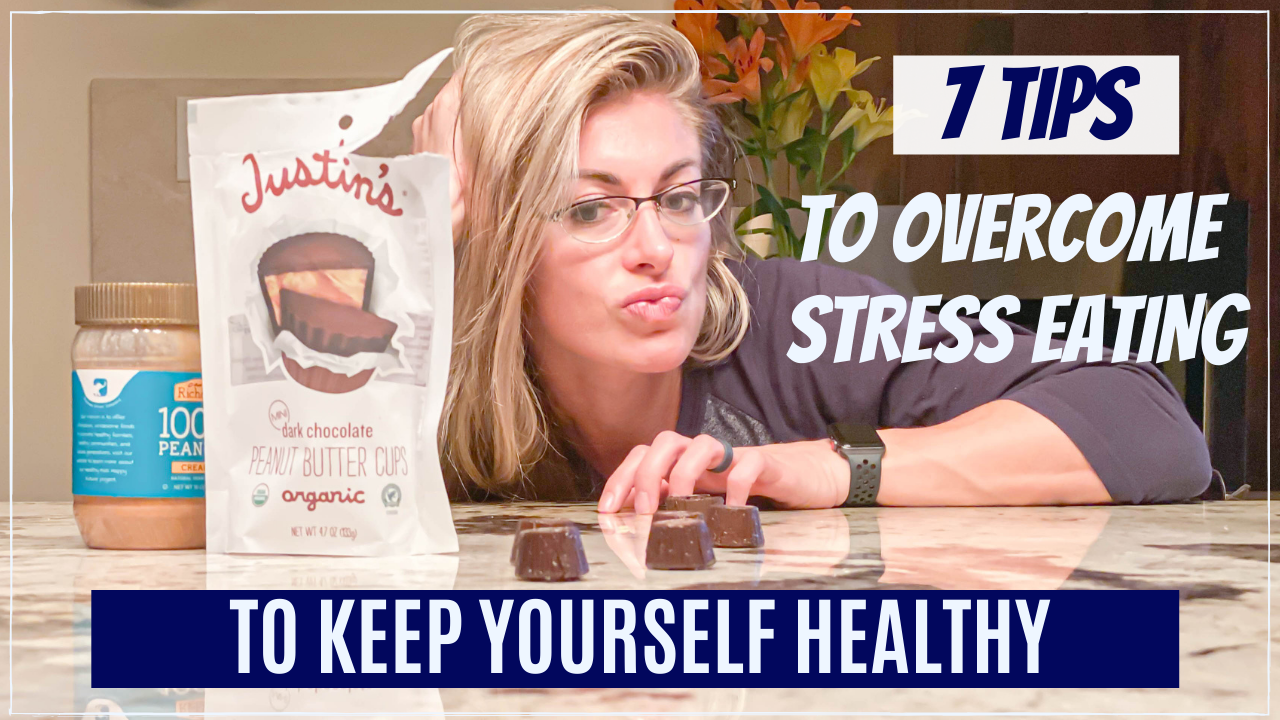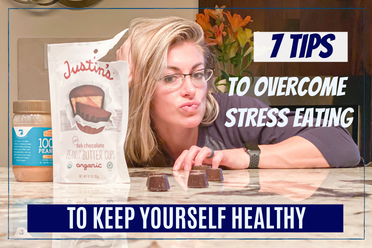
Stress eating is also known as Emotional or Comfort eating and is defined as:
“Eating, often excessively, as a response to stress, boredom, unhappiness, or other emotional condition, rather than as a response to physical hunger”
We are all having and have had times in our life where we used food as comfort, to cope, and to calm our stress. I’ve been seen to stress eat dark chocolate and peanut butter so there is no judgment from me. It’s important when we go through seasons of life that handle ourselves kindly, with love and compassion.
It’s important to know that emotional eating isn’t great for your health if you continue to cycle. You want to do better but unsure how to regain your footing? Let me offer you a lifeline that may help pull you out of deep water.
In today’s episode, I’m going to share with you 7 Tips to help you with stress eating and what you can do to help overcome it and keep yourself healthy.
Remember the things that belong in your diet are carbohydrates, protein, fats, fiber, and micronutrients. You can learn more about those and how much you need daily HERE. Things that don’t belong in your diet are guilt, loss of control, and anxiety.
STRESS EATING TIP 1 – Forgive Yourself
Forgive yourself when stress eating happens. There’s already guilt. Beating yourself up and sitting in that guilt only perpetuates the cycle.
STRESS EATING TIP 2 – Check-In
Feel what you need to feel. Food satisfies physical hunger, that’s all. Negative emotions in our bodies such as fear, boredom, sadness, stress, anxiety, or even anger are emotions that can’t be sidelined or buried by food. Food is a distraction or even a chemical neurological release. However, food will never satisfy the root issue. It’s awesome to keep a food journal and start paying attention to some things that cause snack or sugar cravings.
Often some of the items that we crave can have a neurological component. For example, sugar causes a neurological response of dopamine and serotonin similar to a drug and is difficult to break.
STRESS EATING TIP 3 – Identify Physical Hunger vs. Emotional Hunger
Tap into hunger and fullness cues. Try to eat when you’re physically hungry and stop eating when you’re 80% full as it takes food a bit to travel to your stomach and register.

STRESS EATING TIP 4 – Use H.A.L.T. Technique
If you want food but you’re not hungry, pause for five minutes and use H.A.L.T. (Hungry, Angry, Lonely, Tired) to check-in. What is on your mind? Do you need to journal? Do you need to be heard, or need a hug, or just to get out of the house?

STRESS EATING TIP 5 – Pattern Interrupt
There are always triggers to emotional eating. If we disrupt or interrupt that sequence/pattern, then we can mitigate the unhealthy pattern and create new healthier habits.
STRESS EATING TIP 6 – Set Yourself Up For Success
If you find that you’re struggling most at home, clean your cabinets out, and have only goal supporting nutrition available.
STRESS EATING TIP 7 – Don’t Let Your Blood Sugar Levels Get Too Low
Going too long without eating can make success in this area difficult. Make sure to eat every 3-4 hours during the day to stay on track.

Do you have tips that have helped you reach success? Please share it below! Remember to love yourself through this process. Make sure to like and share!


1 comment
[…] Cravings and crazy stress eating. […]